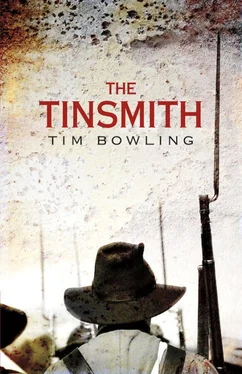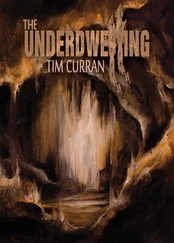The young soldier, too, with his firm hand, made the long night bearable. Even on a few occasions when Anson began to make mistakes, the soldier lightly coughed or shifted his body. Once, when Anson uncharacteristically began cutting away too much tissue from around a bone, he even spoke.
“I’ve noticed that you generally leave more skin than that.”
Anson shook his head, wiped his eyes, asked for the candle to be lowered.
“Thank you,” he said after a few seconds. “You’ve just saved this man a great deal of grief.”
The soldier pulled back with the candle, his face briefly rivered with the light.
The work continued. Anson came to depend heavily upon the soldier’s help, but the surgery was relentless. Some time after midnight, Anson paused and looked up from the table. From far across the fields, beyond the woods, came a low rumble and tramping, the sound of troops on the move. What did it mean? Anson turned, but the tall soldier wasn’t there. A new man, just as young, very pale, his face a wilting blossom, looked down at the wounded man in amazed disgust.
“The man who was here before you,” Anson said. “Where did he go?”
Backing away from the table, as if terrified that he’d fall into the wound, the new man—Anson vaguely recognized him as a musician from his own regiment—said, “I don’t know. I was just told to come over here. Sound asleep I was too. Haven’t slept in days. It ain’t fair.”
Anson made a brief prayer for strength, clutched at his stomach for the hundredth time, and returned to work.
By the time another daybreak approached, he noticed his cutting had become less efficient, more ragged; he could not help it. Pain flared across his shoulders, down his spine—the rheumatism back in full force. Latin was only a dead language now, as dead as everything else around him.
“Here’s another, Sam,” he said to the assistant surgeon in charge of registering the dead as he lifted a body from the table.
The surgeon’s reply was drowned in a burst of shouting, followed by the pounding of a horse in gallop. Anson looked to the east. The sky had lightened slightly but he could see nothing against it. The dark seemed oddly still, alive with unseen forces.
“What in tarnation was…”
“Shh! Listen!” Anson said.
The pounding of hooves surrounded them. Anson whirled. Voices shouted the air into fragments. Then a dark mass exploded a few feet to the left, a terrible long screeching neigh ripping down the sky.
“Don’t shoot, you damned fool!” someone ordered.
Anson stared toward the clusters of grimy tents, each one full to overflowing with wounded. In fact, much of the overflow still lay on straw inside the barnyard fence rails, very much in the horse’s path. They’d better shoot it, Anson thought, scrambling toward the tents, or it’s going to trample somebody.
A torch blazed up, rolled like a burning eyeball through the dark. Someone shouted for it to be doused. A few swinging lanterns emitted a dull yellow light. In its muted glow, the powerful charger reared up, kicking its front legs. The shadowy forms of men flung back and forth.
Then Anson saw it. Briefly but vividly. A rider lay along the horse’s neck, his bare head a shifting stain against the white hide. Then the horse and body plunged into the surrounding dark once more.
Seconds later, a shot rang out, crisp, resonant, like a single toll of a church bell. The living dark grew placid. Slowly, out of the silence, crawled the familiar groans of the wounded, for whom a runaway horse meant nothing, not even a chance to put them out of their misery. Anson heard low voices not far off, and walked painfully toward them on swollen feet.
A group of soldiers stood loosely around the regimental surgeon. Even in the dim lantern light, Josiah Rawley’s gaunt face glowed savagely. In his hand he held a pistol—his arm rested across his chest with the pistol set on his opposite shoulder. It was a curious, statuelike posture, but Anson could see how exhausted his superior was.
“I gave an order not to shoot,” said a young major, stepping up to the surgeon.
“My apologies.” Rawley lowered his arm from his shoulder. “I didn’t hear the order.”
Startled, the major simply nodded. Then the whole group turned its attention to the dead horse.
“Sir.” The major addressed Rawley in a grave tone. “I think you’ll want to take a look at this.”
Anson followed a few more paces into the darkness, then knelt beside the surgeon over a body on the dew-damp ground.
The light came on, grey and thin. The lantern shone less vividly by the minute.
The dead man was not in uniform. He lay flat on his back, one arm tight against his side, the other flung out, as if to point at the terrifying approach of death. His cloth shirt hung in shreds over his chest and his breeches were down around his thighs, the long leather belt almost completely detached from the waist. In both his clenched hands sprouted clutches of horsehair. Anson recognized the wild, laughing grin that covered the man’s scratched and bloodied face. It was as terrible a death mask as he’d ever seen, but the body contained a grimmer secret: the man’s genitals had been hacked off—only a bloody stump of gristle remained.
“Like somethin’ a Indian would do,” a soldier said calmly. “Only we ain’t in Indian territory.”
After a brief examination, Rawley determined that the man had died of severe blood loss. Then he suggested that the major take the matter up with someone higher in the chain of command.
“This man’s a civilian,” Rawley said grimly. “He had a contract for gathering up dead horses.”
They all looked at the fallen charger, which had collapsed into almost a perfect kneeling posture, its eyes shut as if in a gentle sleep. But blood drenched both flanks and spotted its neck, destroying all thoughts of gentleness.
No one spoke for a moment. Their breath hung faintly between them. Then a man with a long, thick beard parted in the middle stepped into the light. He did not wear a uniform. Instead, his thick chest appeared between the open sides of a long woollen coat that reached almost to his boot tops. When he spoke, his voice resonated with a heavy Scots brogue, which nevertheless contained a curious jocular quality. Overall, he gave the impression of the sun breaking through a dark bank of cloud.
“It’ll be a fine day. If ye don’t mind, major, I’d like to do a study of the horse before ye take it away. I canna think who has the contract now, but if the animal could only be kept like this…”
The man lowered himself to his haunches and squinted through a gap between the thumb and forefinger of one hand.
“What are you on about, man?” Rawley bristled.
“Aye, if ye can give me a few hours, I’ll just bring the wagon up.” He stood and backed slowly away from the horse, his hand still over his eyes.
“You have no authority to be here,” Rawley said. “’This is a hospital and civilians are suffered here only when I…”
The Scotsman turned. Calmly, he said, “My authority comes from General McClellan.” He held out a small card, one of the fashionable cartes de visite.
Rawley squinted at it in the oyster-coloured pre-dawn light.
“Photographer? For the army?”
“That’s right.”
Rawley seemed on the verge of either spitting or yelling. “And what blasted use to the Republic is a photograph of a murdered slave owner’s dead horse? I suppose you’ll be wanting the corpse left here too.”
The Scotsman smiled. He had a broad, strong face. The skin around his eyes crinkled as he stroked the forked ends of his beard.
“Nay, that won’t be necessary. There’s no ee much of the sublime in that. If he were a soldier? Nay, not even then. I dinna ken the public is ready for something quite so terrible.”
Читать дальше












